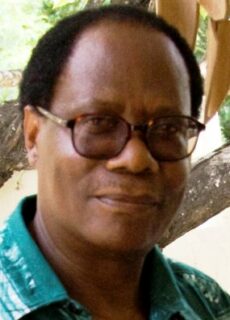
Euphrase Kezilahabi
Euphrase Kezilahabi, Tanzanian poet, novelist, and scholar, is perhaps the most widely known and acknowledged contemporary Swahili author. He was one of the first African writers to publish a collection of free verse poetry in Swahili, and he has had a great impact on the development of the genre of the novel in Swahili.
Kezilahabi was born in 1944 in Namagondo, a village on Ukerewe Island in Lake Victoria. He got his primary and secondary education in Ukerewe, and his BA and MA degrees at the University of Dar es Salaam, completing his MA degree in 1976. Later Kezilahabi continued his studies at the University of Wisconsin, in Madison, USA, finishing his second MA in 1982 and his PhD in 1985. Nowadays Kezilahabi is working as professor of African literature at the University of Botswana.
Kezilahabi's first poem collection, Kichomi (Twinge) was published in 1974. Except for one poem (written in shairi metre) it is written in free verse and with modern content, dealing with topics traditionally regarded as taboos. The publication of Kichomi created a fiery debate on poetry as conservationists and modernists argued over whether free verse poetry can be called Swahili poetry. Traditionally, Swahili poetry was written by native Swahili speakers, Muslims living on the coast of East Africa. Suddenly there were some young university students from interior Tanzania, for whom Swahili was not their mother tongue and who wrote poems in Swahili in a way that no-one had before. The phenomenon was connected to a change in the body of Swahili speakers: instead of the language of a limited Muslim community living on the coast, as it had been, Swahili was becoming the lingua franca of the whole East Africa, spoken by more than one hundred million speakers.
Kezilahabi's further poem collections, Karibu ndani (Welcome Inside, 1988) and Dhifa (Feast, 2008), are also in free verse. Important themes in Kezilahabi's poetry are death, life, existence, silence, and time. He frequently uses onomatopoeia and other sonic devices, drawing influence from the oral literature of his mother tongue, Kerewe.
Kezilahabi's poetry is seminal not only in its form but also in its content, giving voice to new, more individualistic and Western-educated Tanzanians, at the same time being connected to ordinary people due to the usage of Swahili. Kezilahabi's literature is also significant for the way it discusses philosophical ideas and conveys philosophy through fiction. #
Sadly, Euphrase Kezilahabi died in January 2020.


